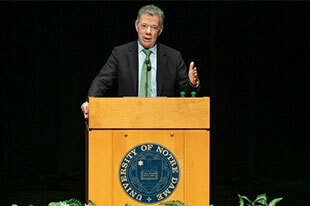The Hesburgh Lecture in Ethics and Public Policy
 Honorable Juan Manuel Santos
Honorable Juan Manuel Santos
The annual Hesburgh Lecture in Ethics and Public Policy, established by the Kroc Institute for International Peace Studies in 1995, honors the Rev. Theodore M. Hesburgh, C.S.C., president emeritus of Notre Dame, a global champion of peace and justice, and the founder of the Kroc Institute.
Each year a distinguished scholar, policymaker, and/or peace advocate is invited by the Kroc Institute director to deliver a major lecture (usually in the spring) on an issue related to ethics and public policy in the context of peace and justice.
Past Hesburgh Lecturers have included:
- Leymah Gbowee (2023), 2011 Nobel Peace Prize Laureate; Liberian peace activist; trained social worker; and women's rights activist (Watch the full lecture »)
- Honorable Juan Manuel Santos (2022), Former President of Colombia; 2016 Nobel Peace Prize Laureate; Distinguished Policy Fellow, Keough School of Global Affairs (Watch the full lecture »)
- Bernardine Evaristo (2021), Booker Prize-winning novelist, essayist, dramatist, and literary critic; advocate and activist for inclusion in the arts
- Angela Davis (2020), world-renowned scholar, activist, educator, and leader in the struggle for economic, racial, and gender justice. (Watch the full lecture »)
- Kimberlé Crenshaw (Scheduled for 2020, Canceled due to COVID-19), Professor of Law at UCLA and Columbia Law School
- Cornel West (2019), Professor of the Practice of Public Philosophy at Harvard University and public intellectual (Watch the full lecture »)
- Beatrice Fihn (2018), Executive Director of Nobel Peace Prize-winning group International Campaign to Abolish Nuclear Weapons (Watch the full lecture »)
- Amitav Ghosh (2017), Author
- Bill McKibben (2016), Author, environmentalist, and activist (Watch the full lecture »)
- Sidney Tarrow (2015), Emeritus Maxwell M. Upson Professor of Government, Cornell University
- Ebrahim Rasool (2014), South Africa's Ambassador to the United States, “Relic of the Past or Template for the Future: Nelson Mandela’s Impact on Peacemaking and Statecraft in the 21st Century”
- Jessica Tuchman Mathews (2013), President, Carnegie Endowment for International Peace
- Amartya Sen (2012), 1998 winner of the Nobel Prize in Economics; Lamont University Professor and Professor of Economics and Philosophy at Harvard University, "The Demands of Justice"
- Francis Deng (2011), Special Advisor to the UN Secretary-General on the Prevention of Genocide and Mass Atrocities, “The Paradox of National Protection in Divided Nations”
- Martha Minow (2010), The Dean and Jeremiah Smith, Jr. Professor, Harvard Law School, “Education as a Tool in Preventing Violent Conflict: Suggestions for the International Criminal Court”
- Shirin Ebadi (2009), 2003 Nobel Peace Prize Laureate, lawyer and human rights advocate in Iran, “Human Rights in the Islamic World”
- Rev. Bryan Hehir (2008), Parker Gilbert Montgomery Professor of the Practice of Religion and Public Life at Harvard University’s Kennedy School of Government, “Beyond the ‘Challenge of Peace’: Pastoral Letter for Our Day” and "The Hardest Case: The Politics and Ethics of Proliferation”
- Shashi Tharoor (2007), author and former Under-Secretary-General, United Nations, “Globalization, Terrorism and the Human Imagination” and “The Future of the United Nations”
- Mary Kaldor (2006), Professor of Global Governance & Director of the Centre for the Study of Global Governance, London School of Economics, "The New Wars in Iraq and Afghanistan" and "Just War and Human Security"
- Congressman Lee Hamilton (2005), former vice-chair of the National Commission on Terrorist Attacks and former chairman/ranking member of the House Committee on Foreign Affairs, “Fighting Terrorism” and “How to Use American Power”
- Kenneth Roth (2004), executive director, Human Rights Watch, “The War in Iraq: Justified as Humanitarian Intervention?” and “Counter Terrorism: Are Human Rights an Obstacle or Part of the Solution?”
- Michael Walzer (2003), Professor Emeritus, School of Social Science, Institute for Advanced Study, Princeton University, “Emancipation and Empowerment: The Global Order”
- Freeman Dyson (2002), Professor Emeritus, Institute for Advanced Study, Princeton University, “Eight Tales for Technophiles: Successes and Failures in Using Technology to Help the Poor” and “The World Economic Forum Debates: The Future of Science and Technology”
- Anthony Lake (2001), Distinguished Professor in the Practice of Diplomacy, Georgetown University, and former Assistant to the President for National Security Affairs, “Balances of Power, Imbalances of Weakness: Globalization and U. S. Foreign Policy” and “Peacekeeping: Defining Success”
- Saskia Sassen (2000), Professor of Sociology and the Committee on Global Thought, Columbia University, “States and the New Geography of Power: De-Nationalized State Aendas and Privatized Norm-Making”
- Martha Nussbaum (1999), Ernst Freund Distinguished Service Professor of Law and Ethics, University of Chicago Law School, “In Defense of Universal Values” and “Religion and Sex Equality”
- Michael Ignatieff (1998), Member of Canadian Parliament and former director of the Carr Centre for Human Rights and Policy, Harvard University, “Barbarism and Civilization in the Age of Human Rights” and “Genocide and Human Identity”
- Richard Falk (1997), Albert G. Milbank Professor Emeritus of International Law at Princeton University, “Democracy and Prospects for Humane Governance”
- Jean Bethke Elshtain (1996), Laura Spellman Rockefeller Professor of Social Political Ethics, University of Chicago Divinity School, “Civil Patriotism or Cosmopolitism?” and “The King is Dead: Sovereignty at the Century’s End”
- Stanley Hoffmann (1995), Paul and Catherine Buttenwieser University Professor, Harvard University, “Problems of Humanitarian Intervention I” and “Problems of Humanitarian Intervention II”
Contact
Kate Chester
Communications Program Director
574-631-8577
cchester@nd.edu
Ari Woodworth
Events Coordinator
(574) 631-3237
awoodwor@nd.edu
Jena O'Brien
Communications and Digital Media Specialist
574-631-3991
jobrie29@nd.edu
Lisa Gallagher
Writer and Content Specialist
574-631-9370
lgallag3@nd.edu